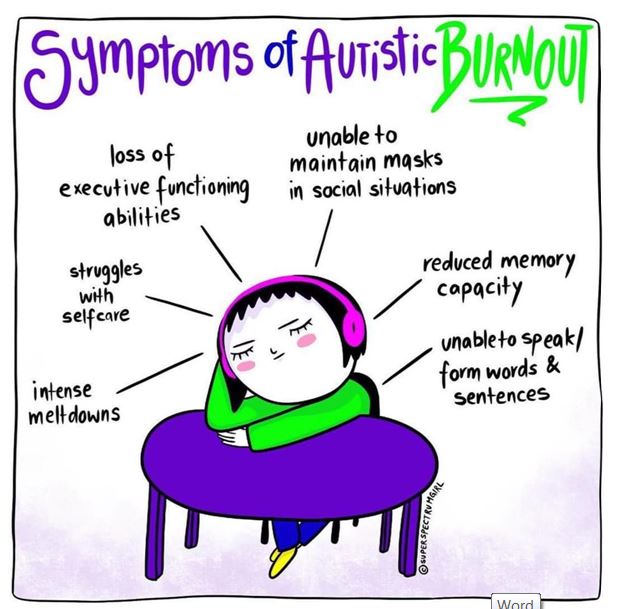Autistic Burnout - Yes...it really is a thing!
Jun 16 , 2021
0 Comments
What is Autistic Burnout?
Autistic Burnout is an accumulation of years of trying to appear normal and cope as a Neurotypical (NT).
The strain and drain of it suddenly becomes too much and a person with Autism falls apart.*
During an autistic person’s life, there may be times when they seem to lose skills or show more obvious signs of autism. For example, a toddler who had a vocabulary of a dozen words may stop talking altogether. A social teenager may find it harder to make appropriate eye contact or take turns in conversation, despite having learned these skills as a child.
This phenomenon is called autistic burnout (or autistic regression, depending on the source). Autistic burnout can be very distressing for the autistic individual and their family, especially if they don’t know what is happening. However, it is important to note that autistic burnout is not necessarily an omen of permanent regression or skill loss.
Source: - https://www.goodtherapy.org/blog/autistic-burnout-an-often-misunderstood-element-of-autism-08062019
Recovery is possible! That's the good news!
The bad news is this is really distressing to see in your child, your student or someone you care about.
What might you see?
Very young children may lose language skills or may even stop talking altogether. They may lose those precious social skills you have worked so hard on them with.
Adults can sometimes communicate how they are feeling but an obvious sign would be an increase in stimming behaviours. See our previous blog on stimming. disAbility equip online ~ Stimming and Positive Academic Performance ~ Shopify (disability-equip-online.myshopify.com)
Adults find themselves having speech issues too as well as general memory issues, difficulty making basic decisions and are in a state of emotional and physical exhaustion.
As the blog post at Good Therapy.org states, there is no definitive diagnostic criteria to determine autistic burnout. The severity and duration of symptoms varies greatly from person to person.
What we do know is that Autistic Burnout does happen when there is increased sensitivity to sensory stimuli and the use of emotional regulating tools assist greatly in supporting that person when life's challenges exceed their own resources.
Research of Autistic Burnout is still relatively new, but overwhelm and the behaviours that result from it, is not new.
Many autistic people are taught from a young age that they must “mask” their autism in order to be accepted in society.
It is important that we all realise that autistic burnout is not a conscious behaviour. A person with Autism is not ignoring social norms, they cannot 'willpower' their way back to 'normal'.
In fact, it is this pressure to conform and to act normal' that often causes Autistic Burnout!
HOW CAN YOU HELP?
1. Engage early therapeutic interventions with a psychologist or therapist
2. Provide emotional regulating tools such as fidget toys, weighted items, sensory swings and balance boards - to assist with vestibular and proprioceptive regulation.
3. Provide a calming space - such as a darkened tents to retreat to, can help with the immediate sensory stimuli that is contributing to the situation
4. Compression - sheets, blankets, swings and pods all provide that extra feeling of support
4. Weighted objects - weighted shoulder pads, lap pads, weighted toys - these often allow the person to focus on the feeling of the item to help block out the other stimuli
DISCLOSURE
This article was solely written by DeO as a general view of this term. Any views and opinions expressed in this blog are not a substitute for professional advice, diagnosis, medical treatment or therapy and should not be used in any other publication without the express permission of DeO.
Reference:
*Barton, J. (2019). Autistic burnout or regression: Individuals on the autism spectrum [PDF]. Retrieved from https://www.scsha.net/assets/handouts/Austic%20burnout_SCSLHA_2019.pdf


